Digital
Collected points from diversity unconference and next steps
April 5, 2017 by laurnarobertson No Comments | Category Digital Public Services
2 weeks ago today we ran an unconference on diversity in the Scottish digital sector for public, private and third sector digital professionals. The discussions were fascinating, but too short according to attendees.
As a result, we’ve set up a #scotdigidiversity slack group so that the cross sector digital community now has a place to discuss ideas for how we create a more diverse digital sector and to figure out how to act on these ideas. If you’re not involved in this yet but want to be, email Gary.Carmichael@gov.scot and he’ll get you added to this list.
Rather than interpret what was said at the 5 discussions, we held a sense making session last week where we grouped the key points from each of the discussions into themes (please let us know if we’ve misinterpreted your point). Below we’ve published all of the points we captured from each session. We haven’t edited these in the slightest – these are the thoughts of the attendees on the day as our notetakers caught them.
Beside these thoughts, you’ll see an image of a Google form for each of the topics. If you click on the image, you’ll be taken off to the form page. These are to help us drive forward what we’ve started so please contribute some thoughts and, if you can, offer to help by clicking yes to the question about playing a role.
There were 5 discussions:
- tech is middle class
- imposter syndrome
- starting them young
- building a diverse team
- inclusive language
If you feel we’ve missed something that was discussed on the day, please contact me on laurna.robertson@gov.scot and we’ll add your point in.
Tech is very middle class
Themes discussed were:
Access to Digital
- Kids have more access to tech at home than in some schools
- Better kit at home to use BYOD
- Another postcode lottery
- Tech is expensive – barrier to entry for lower incomes
- Is this because of the price of technology? Less around the home may lead to less engagement
- Inability to practice skills learned via community at home
- Engagement through digital means exacerbates digital exclusion
Support with life skills
- Shouldn’t need academic skills – but that requires more support (to engage – timing etc.)
Recruitment
- Less requirements in job specs to make jobs less intimidating
- Different recruitment products
- Removal of academic standards for jobs
- Recruitment needs to change. Are uni degrees needed? Can we do blind recruitment based on skills not qualifications?
Perception
- How do we make tech / education feel normal for kids from working class backgrounds?
- Having role models from different ‘class’ backgrounds
- Not specific to ‘tech’ though education (higher) and professional roles in general
- Prev. working class assoc. reception now changed
- Tech / digital seen as something for the elite and wealthy
- Think it links to a bigger issue in that people don’t know what jobs exist in digital and how
- Is digital worse than any other profession and so, how have we allowed it
Teaching
- Does this come from society / education?
- Journey from non-higher education tech digital!
- Academic ‘tickboxes’ misc. other skills – social media, overall tech comfort
- Internet safety, 2 year old, primary, feels, nursery
- Coding in schools tech companies branding out
Apprenticeships
- Apprenticeships – lottery and nepotism?
- Modern apprenticeships – but also age gatekeeping
- They can use their skills (more and more apprenticeships)
Capabilities
- Our own inability to recognise talent – challenge our biases
- Need to hit the ground running – lower focus on training
- Hard for even us in the industry to think of what roles there are
- Skills shortage – businesses have a role to play
- Where is funding for non-graduate pathways?
- Need to translate individual skills to digital roles
Reality for business owners
- Hard to keep afloat as a small business (95%) – not blind to issue but hard to engage
- digital agencies have this too – middle class bias
Changing career
- Don’t exchange anyone past young adult stage. It’s about making changing career easier too.
Imposter syndrome
Themes discussed were:
 Digital imposters
Digital imposters
- Takes a long time to see fruits of labour
- Lack of solid ‘product’ can lead to more impostor syndrome in digital world
- Get rid of the idea of ‘real techies’ as all-knowing geniuses – nobody knows it all!
- Terms – ‘digital’ vs ‘tech’ and ‘IT’ vs ‘coding’
- Digital world – easier to be an impostor
- Digital and tech difference
- Digital’ can suggest broader speciality
Tools and techniques
- Practical skill – listening
- Praise sandwich
- But presentations can be helpful -takes focus off you and onto product
- 2 stars and a wish
Government culture
- Barrier of competency in promotion
- Encourage culture of discussing ideas/prototypes vs ‘presenting’
- Organisational culture can discourage admitting weakness
- History and culture of org
Level of impostor syndrome – team vs individual
- Do teams get impostor syndrome?
Starting them young – digital education from primary
Education
- What about young people that the “formal” system fails?
- Changing quickly – adapting at the right pace is difficult
- As well as the here and now, important to understand how tech has evolved
- How tech should and shouldn’t be used e.g. cyberbullying
- Security and protection / data protection myth
- How do we connect children’s love of iPads, YouTube, smartphones etc. to interest in the digital sector?
- More practical workshops – ‘cooler’ for kids (over school)
- Making interesting learning experiences
- No one person is responsible for this (more than just (primary) schools)
- Not just about school but extracurricular activities too
- Stop talking about “digital natives”! YP (young people?) very good at consuming digitally but not creating/producing!
- Why do we keep talking about digital natives? It adds barriers.
- Upskilling – ask kids what they want to learn
- Mixed levels and postcode lottery of ICT at primary school
- Empower digital leaders to work with kids (so the burden is not always on teachers)
- Reluctance to embrace GLOW for digital education
- The solution isn’t more computing teachers – needs to be built into everyone’s capability
- Perception is a need for more computing teachers
- Need for a ‘pre’ CodeClan (digital academy)
- Teachers fear kids know more than them
- Are teachers given enough training to be confident in delivering digital?
- The “have nots” don’t have the devices to develop/maintain their skills
Start Earlier
- Earlier the better – opportunities in Tech (and wider STEM) need to be presented as options to all from nursery upwards
- Don’t miss the boat – automated curriculum tools (speech recognition, etc) causing issues (e.g. an increase in physical writing illiteracy)
- Start even before primary and address gender stereotypes
- Agree importance of starting young but must be a balance – younger people’s reliance on tech is already a concern
- STEM and digital should be started as early as possible
- “Baffled” it isn’t taught earlier in school
- STEM from nursery
- Goal setting is everyone’s job – not just schools’
Educating parents, teachers, and wider society
- Business and education partnerships
- How digital industries liaise with education department to help shape curriculum
- Getting parents/carers involved and interested – they are still the most important influencers for young children
- Teachers need education in using digital tools across subjects, and in understanding the career opportunities in tech and STEM
- Adults can learn ‘hard’ skills – instil in kids the ability to think creatively
- Not just schools – community-led incentives to take burden off schools
- Not just schools!
- Enable sharing between students/kids and teachers (often the kids can teach them!)
- Bring outside expertise in
- Parental/societal fear about digital
- Tech savvy at a young age, e.g. buying programmes on Amazon
- Education for family/community from media
- Educating parents about digital (preschoolers +)
- If teachers teaching it they are up to date with tech bring experts in (Are teachers up to date with tech? If not, bring experts in)
Creativity
- Importance of creativity, not just using technology
- Holistic view of tech – not just the hard skills, understanding and nurturing creativity
- It should be more general – logic/reasoning not coding
- Creating spaces outside of the classroom where you can create and explore digitally
- Hard skills are easy to learn – creative thought/thinking from an early age are key (not an answer to gender imbalance, but I don’t think the answer is just earlier)
- “palm of their hand” yet many kids not interested in how their devices work – could Apple etc do more when selling devices?
Role models
- Need to show young people what digital careers look like
- Strong role models from an early age to remove gender stereotypes
- Media image – tech is cool
- Media biggest influence – youtube, ads
- Girls feel that STEM subjects don’t have good role models – how to fix this?
- Need role models into education environment e.g. challenge the stereotypes as shown in the “draw a firefighter/surgeon/fighter pilot” video
- Kids are inherently sexist – need to change this by showing role models and different opinions
Stereotypes
- Parents/carers biggest influence
- Girlguiding research says 52% of 11-21 group think STEM is for boys – too late
- Tell our girls to be brave, strong, to believe
- Normalised through TV shows, games, books, apps, dolls, figures, etc
- Techie/non-techie stereotypes
- Change/stop early stereotypes
- Societal responsibility to remove ingrained stereotypes
- Gender stereotypes deeply ingrained – ads, etc
- STEM subjects are for boys – aargh
Finance
- No dedicated IT teacher or overlaps with responsibility for PCs – half of pcs don’t work. no budget.
- Budgeting – how can it be less of a lottery, less dependent on volunteers?
- Re-budgeting of IT early – primary schools
- Schools BYOD policies are different in 32 councils
- Connectivity issues for schools
- Teachers admin budgets due to curriculum for excellence issue will limit to digital
- Increase access to digital inclusion classes (i.e. how to use the technology)
- Can schools partner with industry e.g. Chromebooks in schools, etc.
- iPad per child is wrong – 3 Chromebooks cost the same as 1 iPad and can do more
- Education blame council IT alter spending – many devices not supported
- IT kit seen as iPads only
- Lottery of tech education
- Education Scotland needs direction from industry to inform their strategy
- Postcode lottery at primary schools
Building a diverse team
Tools and techniques
- Hacks/jams – show demonstrate ways to get involved
- Take names and ages off of CV’s
- Free coding training – codebase
Skills vs. Qualifications
- Professional qualifications for digital sector
- Narrow view of skillset/expertise
- Ideas are your currency vs traditional qualifications
Leadership
- Needs to come from the top
- We have an industrial idea/model for our work force
- Women in leadership training
- Provide people with training and exposure to other aspects of business – strategic
- Promote/be visible about culture of workplace
Recruitment
- Look at people not like yourself
- Accept unconscious bias
- Diversity as a tick box
- Consciously changing how we get teams
- Think about different ways to build teams
- Challenge – Finding people of right (technical) skill set
- Promoting internally does not promote diversity
- Choosing who represents your company increases commitment to diversity
Highlighting disability in diversity
- Struggling to see where disability fits
- Diversity includes disability
Working together
- Be more compassionate about how we communicate
- What about emotional intelligence – being empathetic
- Diverse teams – right tech skills, non-traditional roles
- How do we share skills in teams?
Inclusive language
More than words
- As recipients of language we should assume goodwill
- Look at people who aren’t like you – unconscious bias training
- More compassionate about the way we communicate
- Use visual language
- Small changes – non-white emojis
- Use imagery to explain and make things more accessible
- Make it understandable
Tools and techniques
- Plain, easy language
- Crystal mark/guides (inclusive benchmark)
- Plain English – simple language
- Use the guides: Crystal Mark
- Equality Impact Assessment
- Pair writing/co design to write content
Ask!
- Asking Black and Minority Ethnic Groups how they want to be spoken to
- Don’t make assumptions
- Hacks (Dropbox) – involve the whole team – influence company direction
- User driven language tested with audience
- Choice of language – their preferred method
- What are the words that put diverse groups off?
- Fear about language ‘what if I get it wrong?’
Workplace communication
- Using job title, avoid pronouns
Outreach
- Offer opportunities to train
- Difficult to recruit
- How do we educate the non-engaged? Enlightening
- Confidence and empowerment (to apply for jobs)
- Marketing – org. communications
- Millenial vs Gen X, how do we share skills work together
- How do you get people from different backgrounds into professions?
- Non-native English speakers
Recruitment
- Get in – Retrain
- Recruitment – job apps
- What phrases or descriptions of roles or team get best/diverse response
- Class/financial element to recruit diff. backgrounds
- Remove names and gender from CV
- Change stock imagery in job ads
- Need diversity in the recruitment panel
- Represent the culture you work in (i.e. job ads)
- Doesn’t stop at recruitment – need to retain talent
- Job adverts images used – more inclusive
- SG Graduate BAME recruitment – language used
- Recognise that you’re not the target audience
- Topic – marketing, blogs, job apps, who you want to recruit
- Open recruitment policy
- Little things put people off ‘male’ words
- Recruitment agency, gathering diversity info
Again, the Google form questionnaires are to help us to collate good practice, come up with a selection of ideas to take back to the group and to help identify who can help take action on these ideas. So if you haven’t already please do help us move these conversations forward by filling out as many of the forms as you like.
In the meantime carry on the discussions on slack and on twitter at #scotdigidiversity.
Tags: digital diversity, diversity

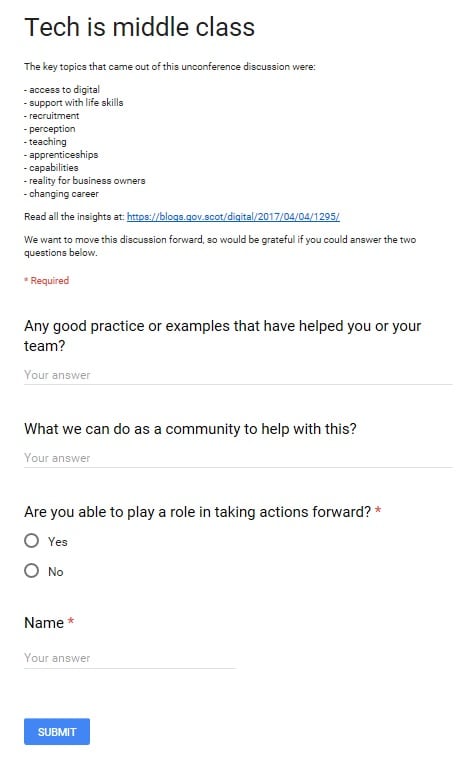
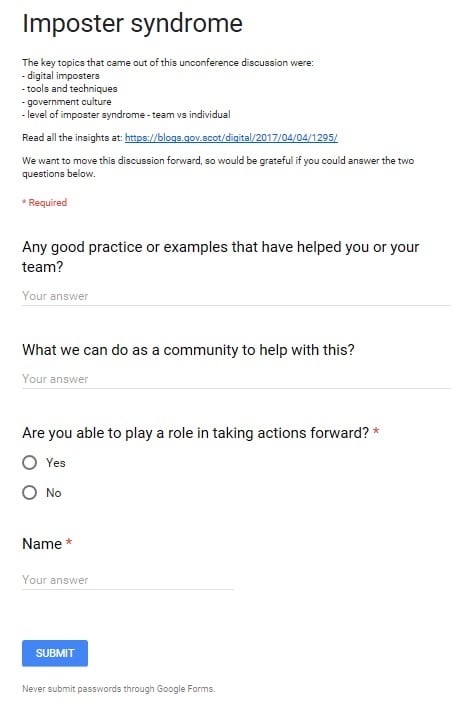
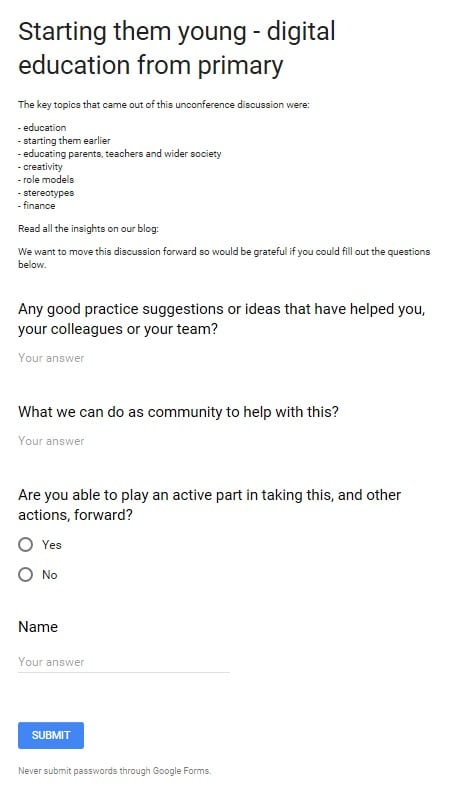
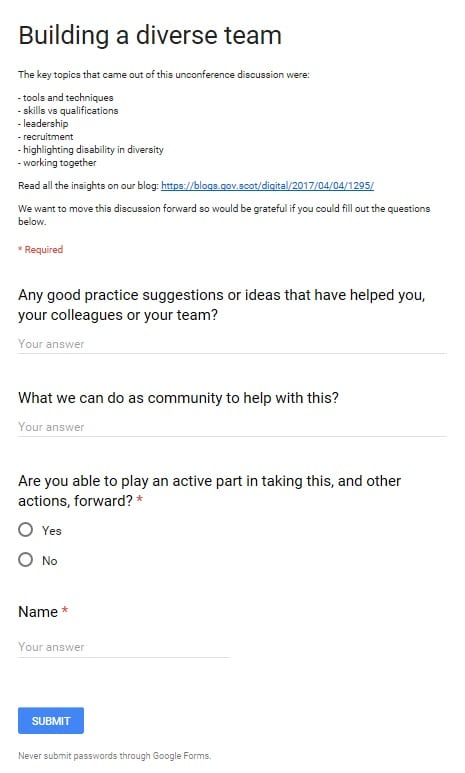
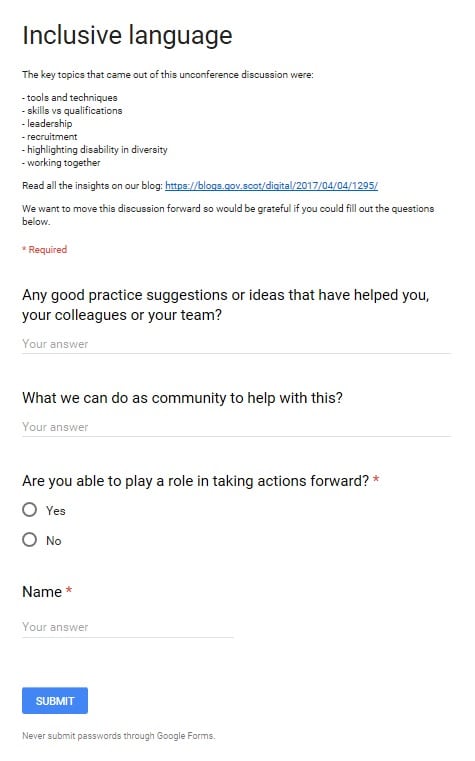
Leave a comment